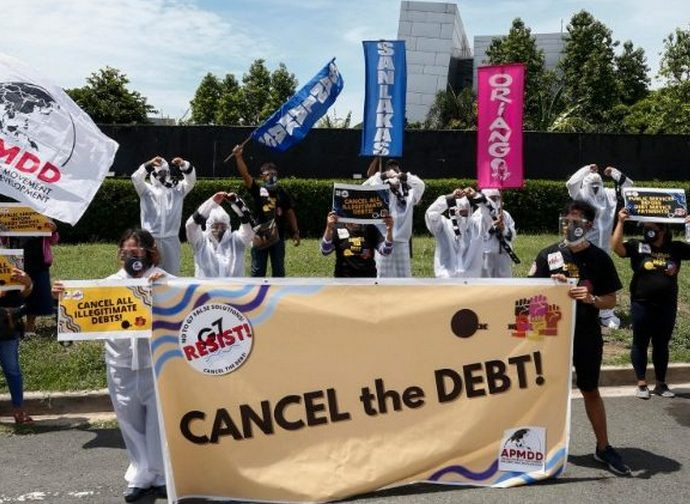Pope’s call for cancelling poor countries debts rewards most corrupt governments
Cancelling the debt of the poorest states is one of the constants of solidarist thinking. But young Africans protest against corruption and oppose the indebtedness of their governments.

Thirty years ago, the young Cameroonian sociologist Axelle Kabou blamed African leaders for their continent's lack of development. ‘We are a generation objectively deprived of the future,’ she said. Since then, also new generations of Africans have felt deprived of a future, and because of this, many young people join criminal organisations that traffic in drugs, arms, human beings, animal and plant products, join the jihad or simply adapt and try to get by in the general system of corruption and misrule that in Nigeria they call ‘a way of life’ and in Kenya makes those who win elections say, ‘now it is our turn to eat’.
But it is precisely in Kenya and Nigeria in recent months that young people ‘deprived of the future’ have organised demonstrations to protest against corruption, identified as the main, fundamental cause of the ills that afflict their countries and Africa as a whole. Tens of thousands of people participated. In Kenya, the government sent the police and army to suppress the protests, fatally injuring and killing dozens of protesters. In Nigeria, President Bola Tinubu discredited the youth by accusing them of being manipulated by people with shady motives. There too young people were shot dead by the police.
At the origin of the protests was the announcement of new taxes, even on basic necessities, unaffordable for the majority of the people and yet deemed necessary by the governments that have to cope with empty coffers and, already heavily in debt, have to resort to new loans, moreover on less and less advantageous terms because of the risk that creditors run of not repaying the borrowed capital.
Just recently, Kenyan President William Ruto has tried to explain, the country's external debt is such that 61 cents of every tax dollar must be spent in repayment of borrowed capital and accrued interest. Trying to appeal to national pride, Ruto spoke of the need to ‘redeem our country and assert our sovereignty’. But it did not help. The young people retorted by denouncing the money misspent by the government, the money taken from the state coffers, the enormous waste, the luxuries that ministers and parliamentarians even boast about by flaunting pictures of villas, swimming pools, expensive cars, trips on social networks. The luxury jet rented by the president to travel to the United States in May with a large delegation alone cost USD 1.5 million, they rebuked him, and the vaunted far greater benefits gained from the visit to the White House, being in essence other millions of dollars in loans will translate, if they are misused again, into other heavy repayment burdens to be compensated with new taxes and reductions in public services.
A few years ago, a photograph of the then president, Uhuru Kenyatta, was provocatively circulated on social networks, accompanied by the announcement to the world that the president was not allowed to borrow more in the name of the Kenyan people and that the country and future generations would not be held responsible in any way for the capital he asked for and obtained.
The young people of Kenya and Nigeria denounce a situation that is common to most if not all states on the African continent. Three countries - Ghana, Zambia and Ethiopia - have recently declared default, others, including Kenya, Nigeria, Egypt and Tunisia, have only avoided doing so by resorting to new loans. In the last ten years, the total African external debt has grown more than the gross domestic product. In fact, it has increased by 183%, four times the GDP growth rate, and exceeded USD 1.8 trillion. This happened in spite of, or rather because, in the meantime, all African countries have benefited from repeated cancellations of their foreign debts to lending institutions, governments and private creditors, which gave them access to new loans on favourable terms. 31 countries have also been included in the Heavy Indebted Poor Coutries (HIPV), an international debt cancellation programme created in 1996, promoted by the World Bank and the International Monetary Fund, aimed at the most indebted poor countries and endowed with a billion-dollar fund.
The bishops of Kenya and Nigeria have courageously sided with young people in denouncing the corruption that squanders billions and deprives them of their future. They are well aware that African states do not need money, but to make good use of their immense natural resources and not to waste their most precious capital, the largely young population.
The Pope for the Jubilee called for the cancellation of the foreign debt of the countries of the South as a way to peace. The next World Day of Peace, to be celebrated on 1 January 2025, has the theme: Forgive us our debts: grant us your peace.
One wonders what the young Africans and the Catholic bishops who care about their future think of that.
What will poor countries do if the “rich” ones get sick?
Even in the midst of the pandemic Oxfam hasn’t changed its tune: it is asking rich countries to help poor countries fight the coronavirus. But the NGO doesn’t ask why poor countries are poor. The answer lies in the tribalism, corruption and violence of their ruling classes. It would do better to ask them for the necessary funds.
